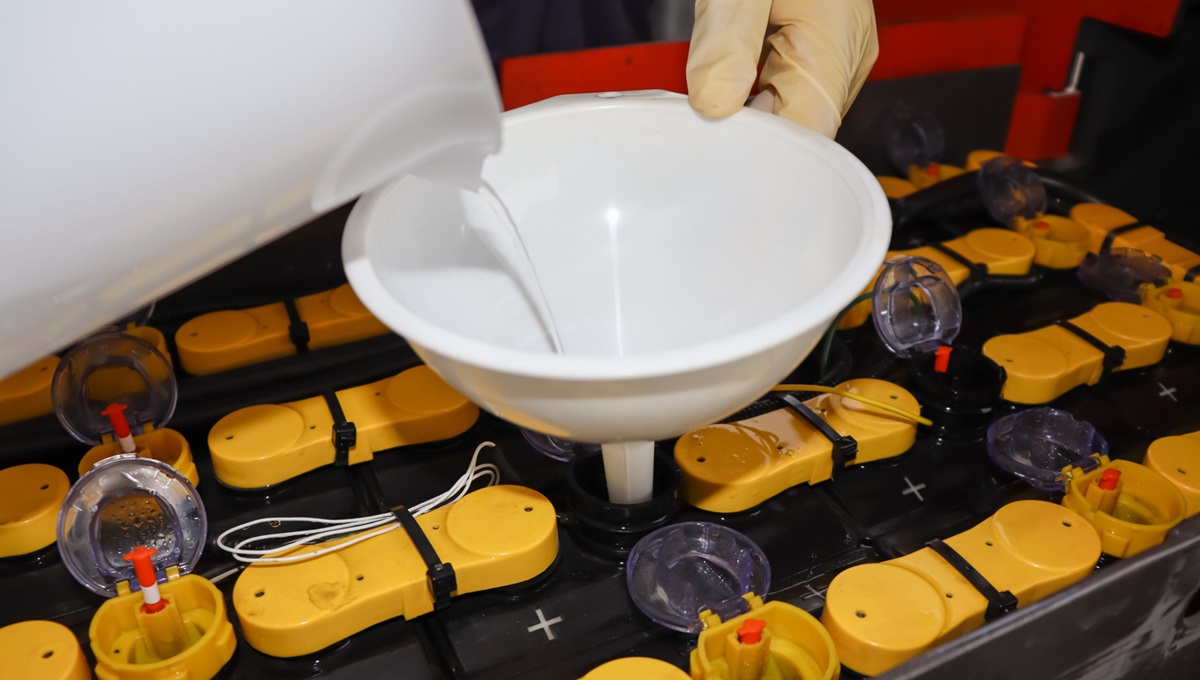

As the facility panorama in India evolves, many households depend on inverters to maintain the lights on throughout frequent energy outages.
A typical question that arises is whether or not Reverse Osmosis (RO) water can be utilized in inverter batteries.
Let’s untangle this query for a clearer understanding.
Understanding Inverter Batteries
Most inverter batteries utilized in India are Lead-Acid batteries. These batteries perform via chemical reactions, and the water utilized in them performs a pivotal position.
Lead and sulfuric acid are the principle elements of all lead-acid batteries. The sulfuric acid is in diluted type with a typical water: acid ratio of three:1.

Over time, on account of warmth and steady chemical reactions, the water contained in the battery dries up. For the battery’s correct functioning and lengthy life, you should high it up with water every time the water stage falls under the minimal stage.
This water needs to be in its purest type with no dissolved solids (almost zero TDS stage).
RO Water and its Traits
Reverse Osmosis is the preferred water purification method in India, guaranteeing clear and protected consuming water by filtering out impurities and contaminants.
RO membranes used in RO purifiers cut back the TDS level of water by 90-99%. Even the simplest RO membranes won’t produce purified water that has a TDS stage under 5 ppm.
Relying upon the TDS stage of enter water, the TDS stage of RO water is usually within the vary of 50-150 ppm.
This implies the RO water nonetheless incorporates dissolved solids.
However can this purified water be utilized in inverter batteries?
Can You Add RO Water to the Battery?
Some folks advise pouring RO water into the battery every time wanted.
Nonetheless, they have no idea that the TDS worth of RO water is way increased than battery/distilled water.
Regardless of its spectacular purification capabilities, RO water falls wanting assembly the stringent necessities of inverter batteries. The presence of dissolved solids in RO water, even at decreased ranges, can result in detrimental penalties for the battery over time.
Utilizing RO or faucet water within the battery reduces the lifetime of your battery considerably.
That’s as a result of the metals and minerals within the RO water not solely hamper the chemical response contained in the battery but additionally get deposited on the lead plates. This reduces the life and effectivity of the battery. Such a battery takes longer to cost, leading to electrical energy wastage.
If you need your inverter’s battery to last more distilled water is greatest to place within the inverter battery.
What’s Distilled Water?
To make distilled water, first strange water is heated and transformed into steam. This steam is collected and cooled to make distilled water.
Distilled water is the purest type of water because it doesn’t include any form of suspended or dissolved impurities.
That’s the reason the TDS of distilled water is within the vary of 0-0.5 ppm.
This water doesn’t have an effect on the chemical response contained in the inverter battery and is due to this fact one of the best.
Conclusion
Within the quest for an uninterrupted energy provide, the water you select on your inverter batteries turns into a crucial think about figuring out their longevity and effectivity. Whereas Reverse Osmosis (RO) water has change into synonymous with purity in our households, it’s not the perfect companion for inverter batteries.
With a TDS stage near zero, distilled water is the purest type, guaranteeing it doesn’t disrupt the important chemical processes unfolding throughout the battery.
Trending Merchandise











